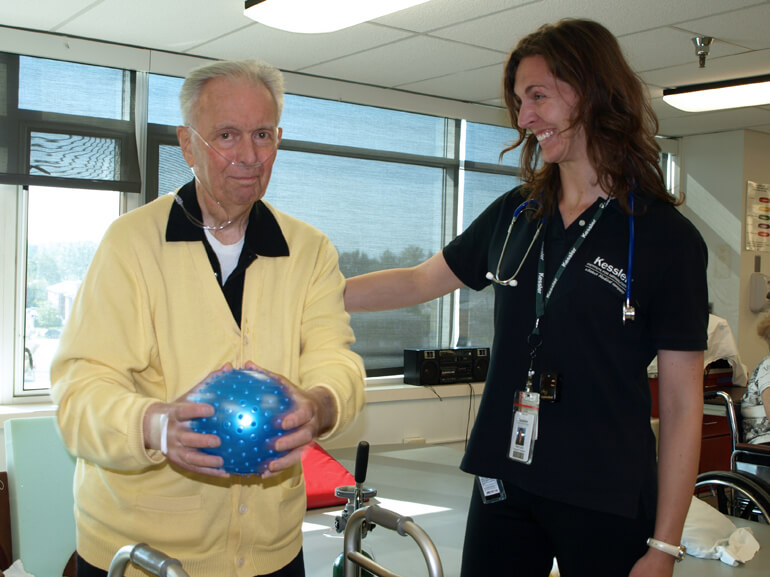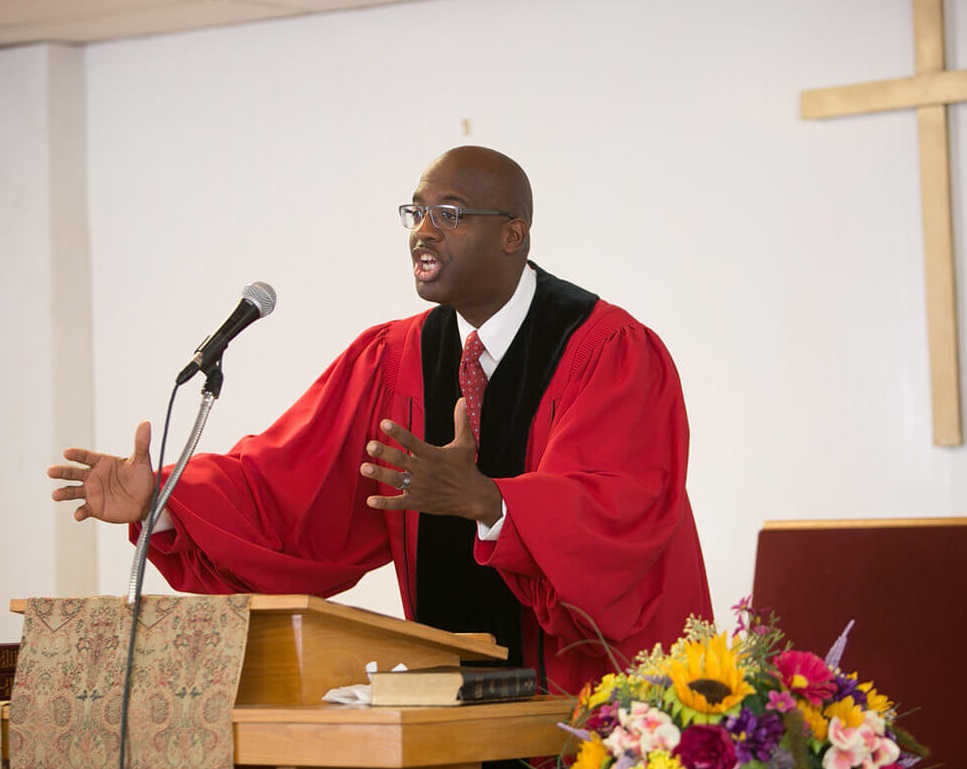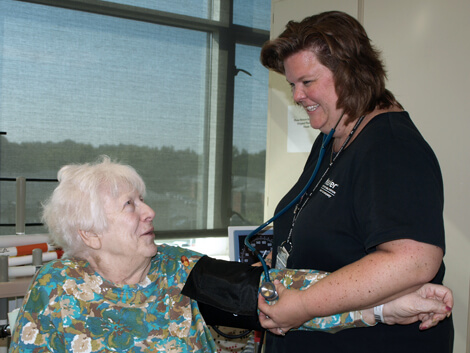Cardiac Recovery

The Penn State Health Rehabilitation Hospital difference
Where a person goes for treatment can make a difference. Studies* show those treated in a specialized rehabilitation hospital – like Penn State Health Rehabilitation Hospital – have greater improvement, fewer complications and return home sooner than patients at nursing facilities. We provide a comprehensive program of medical, nursing and therapy care that can optimize your strength, skills and abilities.
*Assessment of Patient Outcomes of Rehabilitative Care Provided in Inpatient Rehabilitation Facilities (IRFs) and After Discharge. Dobson DaVanzo & Associates, LLC. 2014.-
Penn State Health Rehabilitation Hospital's experienced team of cardiac recovery specialists help manage post-surgical healing and prepare you to return home and transition to life ahead.
This interdisciplinary team is led by a physiatrist, a physician board-certified in physical medicine and rehabilitation, and includes rehabilitation nurses; physical, occupational, respiratory and recreation therapists; speech language pathologists; psychologists; pharmacists; dietitians; case managers and other clinical and support staff as needed. We also work closely with your cardiologist, surgeon and other doctors.
-
Penn State Health Rehabilitation Hospital’s Cardiac Recovery Program focuses on the skills, strategies and techniques you need to restore strength, avoid complications and move forward safely and confidently. Your team will establish specific cardiac parameters and monitor you closely, particularly during exercise, rest periods and recovery after exercise. In addition, we will provide the care and extensive training to help you:
- Protect your incision while dressing, grooming and bathing
- Practice sternal precautions
- Follow guidelines to minimize pain, swelling and the risk of potential complications
- Maintain blood pressure and cholesterol levels
- Improve any vocal or swallowing issues
- Use adaptive equipment to facilitate self-care activities
- Transfer safely in and out of a bath tub, shower, toilet, chair and car
- Move in and out of bed and turn properly
- Adapt new ways of performing daily activities
- Conserve energy
- Prepare you to begin a cardiac rehabilitation program under the direction of your cardiologist or surgeon
-
Your treatment team will review medications, including anticoagulant therapy and diabetic protocols, and discuss a range of topics including diet, pain management and exercise. We will provide you with the knowledge and strategies to better:
- Understand your surgery and its effect on your body
- Recognize the signs and symptoms of possible infection
- Manage your medications and be aware of any side effects
- Monitor your weight and recognize the importance of weight management
- Monitor your blood pressure and heart rate
- Maintain a healthy lifestyle including following a heart-healthy diet, smoking cessation and stress management
- Utilize the tools and strategies that will help you transition home and resume the activities you enjoy
-
Gaining an understanding of your condition, strengths and limitations will help you prepare for life ahead. Your team will support you in building physical, mental and emotional strength, and educating you on important topics, including:
- Understanding heart health
- Targeting risk factors
- Monitoring your health
- Medication management
- Nutrition and healthy eating habits
- Weight management
- Conserving energy
- Tobacco cessation
- Resuming daily activities
- Dealing with stress
- Modifying your lifestyle
- Creating a safe home environment
-
To help you successfully maintain life at home, work, school and/or in the community, Penn State Health Rehabilitation Hospital offers an unparalleled continuum of care. You can build on the gains made during your inpatient stay by participating in Penn State Health Rehabilitation Hospital’s outpatient programs, offered at our four hospital campuses and more than 95 Penn State Health Rehabilitation Hospital Rehabilitation Centers throughout the state.
-
Penn State Health Rehabilitation Hospital’s cardiac recovery patients have greater improvement during their stay and a higher level of independence upon discharge, based on national benchmarks*. Nearly 99% of our cardiac patients met their goals and expressed satisfaction with the care they received in independent patient surveys.
* Source: eRehabData.com

Your progress. Our program.
Penn State Health Rehabilitation Hospital’s unique Cardiac Recovery Program is individually tailored to meet your medical, physical and functional needs, as well as support maximum gains in your cardiovascular health, physical strength, independence and overall well-being.-
For more than 70 years, Penn State Hershey Rehabilitation Hospital has pioneered the field of medical rehabilitation. Today, we continue to provide advanced care and innovative treatment. That includes hands-on therapies and proven technologies to help you regain strength, skills and mobility and resume a healthy, active lifestyle.
-
Your ability to perform daily activities at home, work, school or in the community is important to your independence. Your therapy team will introduce a variety of tools, techniques and strategies to help you manage these tasks. This includes adaptive equipment, such as reachers and other devices to help you get dressed and do household chores. In addition, electronic and computer-based technologies, including voice-activated software and electronic controls may be introduced.
-
Preparing you and your family for life ahead is one of our primary goals. We provide extensive education, training and support to help you understand your condition, monitor your health, adopt new strategies to manage everyday activities safely and plan for life ahead.
-
Following a cardiac event, individuals may need a walker, wheelchair or other assistive device as they regain their strength and mobility. If needed, Penn State Hershey Rehabilitation Hospital’s physical and/or occupational therapists, who are certified assistive technology professionals and/or seating and mobility specialists, will evaluate your physical and lifestyle needs and use pressure mapping and other tools to find the best options for you.
-
To help reinforce your skills and restore your spirit, Penn State Hershey Rehabilitation Hospital’s specially trained Canine Companions for Independence* may be part of your therapy program. A number of our therapists work with these remarkable dogs to engage patients in a wide range of activities that support the rehabilitation process.
*Not available at Penn State Hershey Rehabilitation Hospital-Marlton
-
The ability to drive is an important part of maintaining an independent lifestyle. Penn State Hershey Rehabilitation Hospital’s certified driver rehabilitation specialists offer the evaluation and training to help individuals return to the road safely. They will also discuss modifications and/or adaptations that may be needed.
